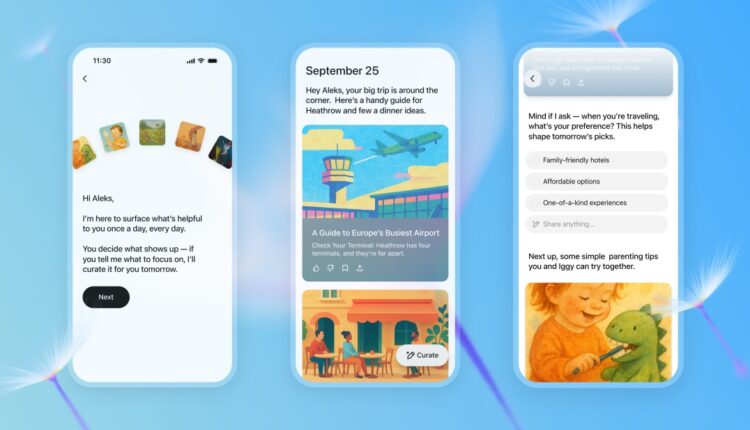OpenAI has introduced ChatGPT Pulse, a new feature that creates personalized morning reports for users automatically. This innovative addition generates five to ten daily briefings while users sleep, positioning ChatGPT as a proactive morning companion similar to social media platforms or news applications.
The ChatGPT Pulse feature represents a significant shift in OpenAI’s consumer product strategy. Rather than simply responding to user queries, the company now focuses on creating tools that work independently for users. This approach aligns with other recent developments like ChatGPT Agent and Codex, transforming the platform from a traditional chatbot into a more sophisticated assistant.
Fidji Simo, OpenAI’s CEO of Applications, explained the company’s vision in a recent statement. She emphasized that the goal is making premium AI support accessible to everyone, starting with Pro subscribers but eventually expanding to all users.
The new feature launches exclusively for Pro plan subscribers, who pay $200 monthly for access. This limitation stems from the significant computational resources required to run ChatGPT Pulse. OpenAI has acknowledged capacity constraints and continues expanding its infrastructure through partnerships with Oracle and SoftBank.
Starting Thursday, Pro subscribers will find ChatGPT Pulse as a new tab within the ChatGPT application. The company plans to extend access to Plus subscribers soon, followed by all users once efficiency improvements are implemented.
ChatGPT Pulse creates various types of content, from news roundups on specific topics to highly personalized briefings. During a demonstration, OpenAI product lead Adam Fry showcased diverse reports including Arsenal soccer team updates, family Halloween costume suggestions, and child-friendly travel plans for Sedona, Arizona.
Each report appears as a visual “card” featuring AI-generated images and text. Users can click individual cards for detailed reports and continue conversations about the content with ChatGPT. The system generates some reports automatically while allowing users to request specific topics or provide feedback.
A distinctive design element sets ChatGPT Pulse apart from engagement-focused social platforms. After creating several reports, the system displays “Great, that’s it for today” and stops generating content. This intentional limitation aims to create a healthier user experience compared to endless-scroll applications.
The feature integrates with ChatGPT’s Connectors, enabling connections to Google Calendar and Gmail. Once configured, ChatGPT Pulse analyzes emails overnight to highlight important messages and accesses calendar information to create event agendas.
When users enable ChatGPT’s memory features, the system incorporates context from previous conversations to improve report quality. Christina Wadsworth Kaplan, OpenAI’s personalization lead, shared how the system automatically recognized her running interest to include jogging routes in London travel recommendations.
Wadsworth Kaplan describes ChatGPT Pulse as offering entirely new consumer functionality. As a pescatarian, she benefits from the system’s ability to analyze restaurant reservations and identify suitable menu options for her dietary preferences.
The computational requirements for ChatGPT Pulse vary significantly depending on the task complexity. Some operations run efficiently, while others demand extensive web searches and document analysis. This variation affects the overall resource allocation and influences the feature’s current availability restrictions.
ChatGPT Pulse cites sources with links, similar to ChatGPT Search functionality, addressing potential concerns about competing with traditional news sources. The development team expects the feature to complement rather than replace existing news applications and services.
Future development plans include making ChatGPT Pulse more agentic, potentially enabling actions like restaurant bookings or email drafting on users’ behalf. However, such capabilities remain distant goals requiring substantial improvements to OpenAI’s agentic models before users would trust automated decision-making.
The introduction of ChatGPT Pulse demonstrates OpenAI’s commitment to creating proactive AI experiences that anticipate user needs rather than merely responding to requests. This approach positions the company competitively in the evolving artificial intelligence landscape.


